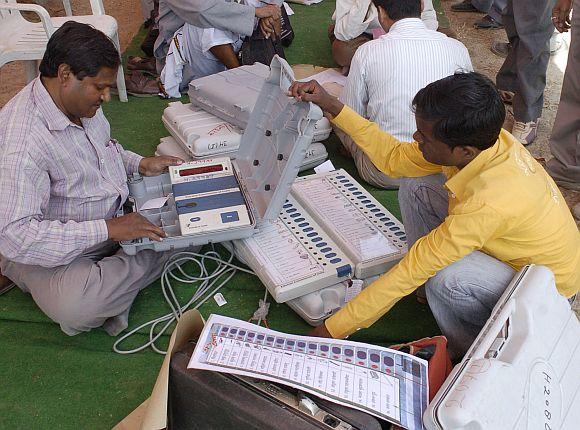'They can't be tampered with because of the very nature of the machines -- they are standalone, and not networked.'
'Also, they can't be rigged because of the kind of custodial security they are subjected to during the election process.'

After electoral losses in recent assembly elections, leaders of the Bahujan Samaj Party and Aam Aadmi Party have alleged that the electronic voting machines (EVMs) were tampered with. They also called for a return to the system of voting with ballot papers.
The Election Commission has rejected these allegations. V S Sampath, former chief election commissioner, speaks to Ranjita Ganesan about the efficacy of EVMs and the security measures followed by the Election Commission.
What do you make of the allegations that have been made? Can EVMs be rigged?
We have been using EVMs for quite some time now. They cannot be tampered with because of the very nature of the machines -- they are standalone, and not networked.
Also, they cannot be rigged because of the kind of custodial security they are subjected to during the election process.
Sometime in 2010 or so, a professor from the United States in collaboration with a man named Hari Prasad stole one machine, they planted a Bluetooth device on that, and they demonstrated on television that with the signals of mobile phone, results can be manipulated.
It was a crude attempt but we clearly told them and the entire country that EVMs used in elections are not available for just anyone to take.
Any electronic device if given to someone can be tampered with, but as far as EVMs used in Indian elections are concerned, they are always under the custody of the Election Commission.
If someone steals it, they will not be able to put it back in the election process.
Even in that case, they could only tinker with the display of machine, and not data.
And that was one machine -- how many such would have to be stolen to affect the result? It is not worth giving any credence to.
What are the safeguards used by the Election Commission?
Custodial security has been tightened. Until 2010, in the non-election season, there was no armed guard for machines, but now, even at non-elections times, there is armed security.
Various checks and seals are done. Technicians from EVM companies come and clean up any old data.
All this is done in the presence of political party representatives. They would ask representatives to test that it is clean and that recording is only according to new votes.
The machines and warehouses are then sealed again.
At the time of collection, when the names of candidate are put on the EVM, it is in the presence of candidates' representatives.
After a random procedure, machines are taken to different polling stations. Thirty minutes in advance, in the presence of political party representatives, another mock poll is done to demonstrate that the recording of votes is accurate.
Then, all mock data is erased, everything is sealed and ready for voting.
After polls also, seals are put on the buttons.
Even when accepting EVMs in counting halls, the seal is checked.
If it is not intact, it is not counted.
Had there been cases in your experience when the machines were not found intact?
The store rooms are sealed and fitted with closed circuit cameras so they are monitored 24/7.
In very rare cases, inadvertent tampering may occur -- for example, the seal may get broken while transporting a machine from hilly areas.
How have EVMs changed the election process? Have they made it safer, compared to the ballot paper days?
There were things like booth capturing 20, 30 years ago, where goondas can go to remote polling stations, get 500 ballot papers, stamp them and stuff them into ballot boxes. Because polling officers were scared, these incidents would go unreported.
With sheer force and goondaism, a candidate would win.
In EVMs, even if there is nobody in the polling station, if you voted with an EVM, a loud distinct sound would be heard 100 yards from the polling station.
Moreover, there is a minimum time taken for each vote to be recorded so 500 votes can't be recorded in 10 minutes or so.
It is not possible to capture a booth and cast votes.
What does the Election Commission do when such complaints surface?
At every stage, there are various safeguards so it is not something you can verify today and give a certificate.
The certificate cannot be given unless it is certain that a sanitised process was followed all through -- at the storage, constituency, polling and counting office levels.
But simply because an election was not according to your expectations, one cannot say there was tampering.
How does India's EVM system compare with election models elsewhere in the world?
Not many countries use EVMs. Among the ones that do, ours is one of the safest.
The only comparable nation is Brazil, where they use EVMs totally, and it is almost identical. They also believe in strong custodial security.











